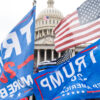A recent decision by the federal district court for the District of Columbia highlights the importance of proper statutory interpretation and fidelity to the text of laws.
Judicial activism comes in a variety of forms and is certainly not limited to the act of striking down a law, as some liberals tried to maintain during the Obamacare litigation. When considering a challenged statute, as Judge Robert Bork put it, “No judge can possibly avoid seeing a case without his own worldview coloring his vision.” Thus, judges may be tempted to read the text in order to achieve their preferred outcomes. Yet judges should recognize that danger and “consciously strive…for objectivity” rather than contorting the text and subverting the law as written to comport with their own notions of justice.
To arm judges with tools to maintain their objectivity, the Supreme Court has developed various canons of construction for interpreting statutory language and certain overriding presumptions. For example, judges should apply the ordinary dictionary definition of words within the context of a statute unless those words are recognized terms of art or otherwise defined by statute. Consequently, the actual text, rather than the more abstract (and often debatable) “legislative purpose” that inspired it, is the most critical tool in ascertaining what a statute requires. In their treatise on statutory interpretation, Reading Law: The Interpretation of Legal Texts, Supreme Court Justice Antonin Scalia and Bryan Garner note that:
To say that words have no meaning…apart from the intention of their author is a ludicrous extension of the thesis that a tree falling in a deserted forest makes no noise. King Lear would still be King Lear if it were produced by the random typing of a thousand monkeys over a thousand years.
In Loving v. Internal Revenue Service, Judge James Boasberg ruled in favor of a group of individuals who challenged new IRS regulations imposing onerous regulations on non-CPA and non-attorney tax return preparers who, until recently, were not required to pass a qualifying exam, pay annual fees, and complete continuing-education courses.
The IRS interpreted a statute passed in 1884 (well before the days of income tax returns) to authorize the regulation at issue, which had previously applied only to attorneys, CPAs and “other specified tax professionals.” Section 330 of Title 31 of the U.S. Code provides for the regulation of “representatives” who “practice” before the IRS.
Since this case involves review of an administrative decision, Judge Boasberg analyzed the claim under the Chevron framework, which normally accords considerable deference to an administrative agency’s interpretation of statutes it has been entrusted to administer. Under Chevron, the judge’s first step is to “exhaust the traditional tools of statutory construction to determine whether Congress has spoken to the precise question at issue.” If the judge determines that Congress was silent or ambiguous on the matter at issue, he then determines whether the agency’s construction of the statute is permissible.
Judge Boasberg proceeded in his inquiry “where all such inquiries must begin: with the language of the statute itself” and determined that, by its text, Section 330 covers representatives who “advise and assist persons in presenting their cases.” He reasoned that an individual presents a case before the IRS during an audit or appeal—not every time he prepares and submits his tax return. This is similar the difference between an individual who drafts a will and another who disputes a will in probate court—only the latter requires an attorney.
Further, as he pointed out, “The plainness or ambiguity of statutory language is determined by reference to the language itself, the specific context in which that language is used, and the broader context of the statute as a whole.” Looking to the broader context of the statute, Judge Boasberg found that the IRS’s tortured reading of Section 330 would “displace an existing statutory scheme that comprehensively regulates penalties on tax-return preparers” and “relegate…to oblivion” another statute that remedies abusive practices by tax-return preparers. Statutory language “cannot be construed in a vacuum…. [It] must be read in the…context and with a view to the[ ]…place in the overall statutory scheme.”
Judge Boasberg concluded that Section 330 unambiguously states that the IRS may regulate representatives of persons in presenting their cases; thus, non-attorneys and non-CPAs who help taxpayers prepare their tax returns do not fall within the scope of “representatives,” and the onerous regulations recently imposed on them cannot stand. Judge Boasberg summed up his careful legal analysis by resisting the IRS’s invitation to consider a number of policy arguments. He declared instead, “In the land of statutory interpretation, statutory text is king.”
This case is unlikely to make headlines outside of the tax-preparer trade press, but it is still an important victory for a government of laws, not of men. We need more judges who, like Judge Boasberg, are willing to perform the sometimes tedious but essential work of enforcing the law as enacted and not as they or government agencies would like it to read.


























